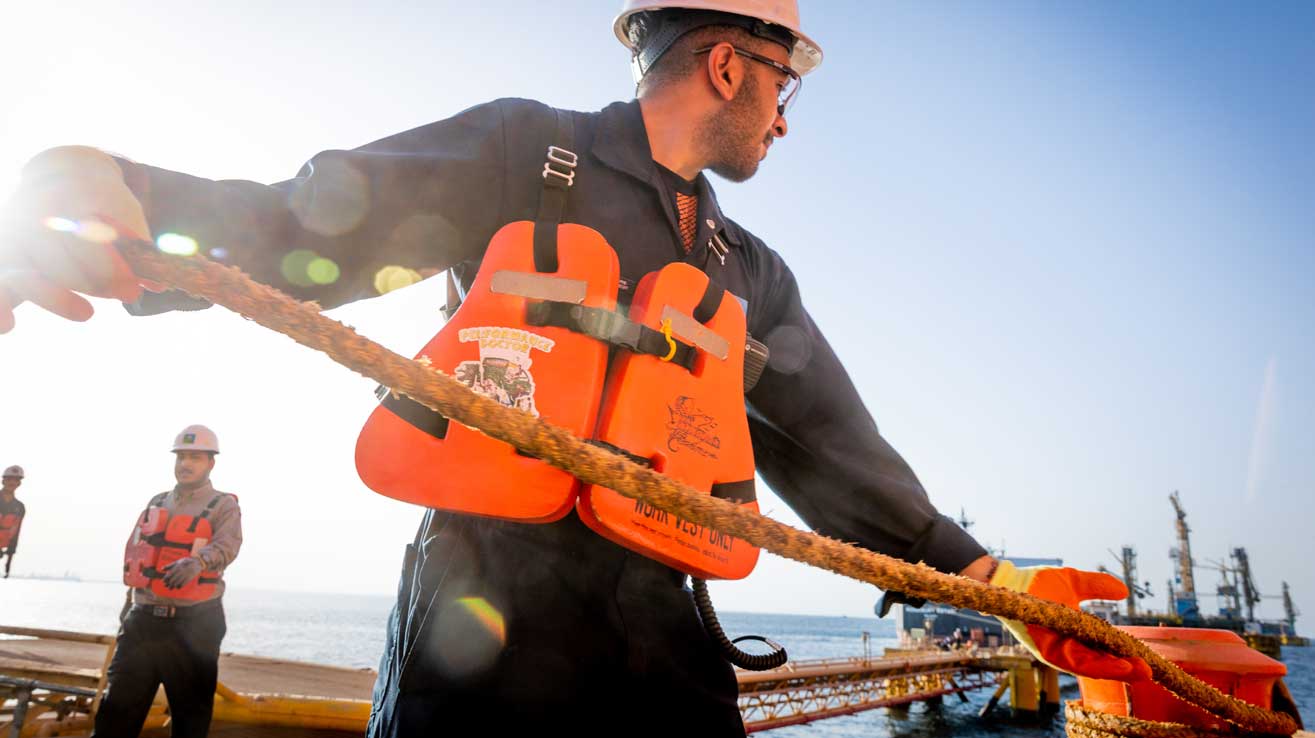The backbone of our offshore operations
An inside look at Aramco’s Marine Department, which is integral to all aspects of our offshore energy production.

- Marine’s function is to help ensure that energy continues to flow from our waters to the global markets
- From exploration to export, Marine offers support at almost every step of our extensive offshore operations
- Marine also provides logistic support, accommodation, and meals to around 30,000 offshore workers
Aramco operates some of the world’s largest offshore fields spanning the Kingdom’s coastline from the Arabian Gulf to the Red Sea.
At the heart of our offshore operations is Aramco’s Marine Department, which collaborates with stakeholders across the organization and manages almost every step of our extensive offshore operations, starting from exploration and drilling to production and oil export. Operating a fleet of over 350 maritime vessels with over 8,000 employees and contractors, Marine also handles offshore crew transfer, environmental remediation, and subsea maintenance and repairs to keep our offshore oil operations running smoothly.
A critical part of the value chain
Our massive offshore projects begin with exploration, for which Marine offers logistical support like providing survey ships to carry out seismic surveys and identifying potential offshore sites. Once a site with oil and gas deposits is identified, Marine offers logistical support by deploying tug boats to position the offshore rigs that weigh thousands of tons so that oil and gas wells can be drilled. During the drilling process, Marine monitors the weather, water current, and waves to ensure that drilling is carried out safely.
Beyond supporting energy production, Marine acts as a service provider, offering transportation, accommodation, and meals to around 30,000 offshore workers, helping to ensure their comfort in challenging conditions. To transport rig crews safely, Marine utilizes a sea bus service that involves two fast crew supply vessels with a combined capacity of 235 passengers and a deck space of 6,318 square feet. The sea bus service, which covers the Safaniya, Manifa, Zuluf, and Marjan offshore fields, transports approximately 55,000 passengers per year.
Delivering energy to the world
Once oil is produced, Marine takes up the responsibility of delivering energy safely to the world. Tug boats are used to tow tankers into position at our terminals for loading hydrocarbons — a process that can take up to 48 hours. The efficiency of tanker operations plays a key role in maintaining the integrity of the supply chain and meeting energy demands — underscoring Marine’s role in shaping the delivery of energy to the world.
Once loading is finished, the oil tankers are towed away from the terminals by our highly-trained harbor pilots who take up the pivotal task of delivering Aramco’s products from Saudi Arabia to the world.
Another critical operation carried out by Marine is managing the vessel traffic, safely navigating hundreds of vessels carrying hydrocarbons on their way to the international markets to prevent potential collisions in the vast and busy offshore environment.
This content is blocked
You need to give permission.
From exploration, offshore drilling to delivering energy, our marine teams play a crucial role in our operations
“We have to be vigilant all of the time. It’s not a 9-to-5 job. It’s 24 hours a day, seven days a week”
He adds, “There is no room for mistakes because one small mistake can be serious. This is why our team works round-the-clock to ensure that energy continuously flows to the market in a reliable and safe manner.”
Aziz S. QarniDirector of Ras Tanura and Western Region Marine Operations
Digitalization focus
Innovation and digitalization are at the forefront of Marine’s operations, constantly seeking to enhance safety and efficiency.
As of 2024, a digital platform called SmartShip has been installed on approximately 60 marine vessels. SmartShip technology creates a digital twin of the vessel utilizing over 1,000 sensors and artificial intelligence for real-time monitoring, analysis, diagnostics, and troubleshooting of our fleet. Using this technology, we are continuously and rapidly collecting data retrieved from our fleet, allowing us to monitor and assess the performance and energy consumption of our vessels.
Marine deploys underwater robots, which are equipped with tools to inspect our huge subsea asset portfolio, meaning less diver intervention is required, which enhances the overall safety of our operations while assuring asset longevity.
Marine is also making efforts to bring sustainability to its offshore and marine activities. At the Tanajib Marine Facility, for instance, we are implementing the Marine Waste Recycling Program that aims to use offshore waste as raw materials for future products. The Tanajib facility area can be thought of as a city at sea — a place with over 500 assets in nine oil fields where over 170 vessels and several thousand personnel provide the logistical support required to keep the world’s largest offshore oil operation running smoothly. In 2023, the recycling program successfully sorted and recycled more than 1,200 tons of waste materials from the Tanajib facility.
We empower our marine experts to take ownership of their critical roles through simulated training at Aramco’s Marine Training Academy
Round-the-clock operations
More from Elements
The material in this article is intended to be for general informational purposes only, and readers should not place undue reliance on the statements or opinions therein. Any information provided speaks only as of the date this content was published and Saudi Aramco undertakes no obligation to correct, update, or revise any statements or opinions made in or implied by this article.








